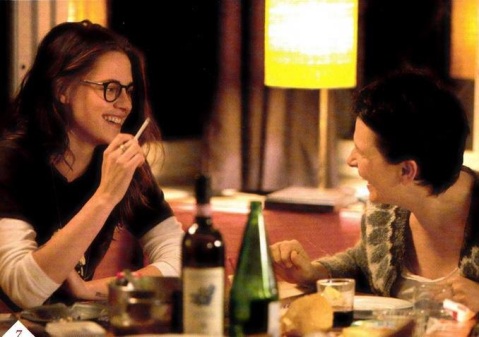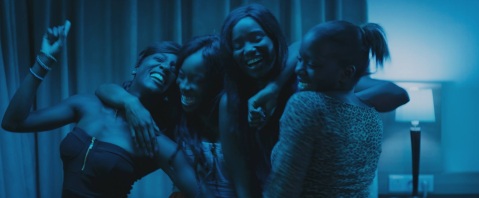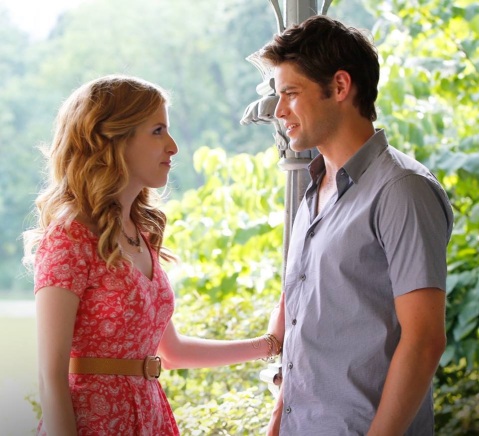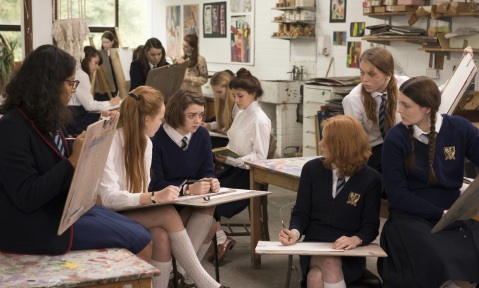Review: Clouds of Sils Maria
Released: 15th May
Certificate: 15
Director: Olivier Assayas
Screenwriter: Olivier Assayas
Cast: Juliette Binoche, Kristen Stewart, Chloe Grace Moretz, Lars Eidinger
Olivier Assayas’ latest centres around the fictional play of Moloja Snake, wherein a young woman, Sigrid, seduces and then abandons her boss, Helen, leading to Helen’s implied suicide. Actress Maria Enders (Binoche), who got her big break playing Sigrid twenty years previously, reluctantly agrees to return to play Helen in a London revival of the piece for auteur director Klaus Diesterweg (Lars Eidinger). Still grieving over the sudden death of Moloja Snake’s writer, Wilhelm Melchior, Maria holes up in his home of Sils Maria in the Swiss Alps with her long-suffering assistant Valentine (Stewart) in order to prepare for the role. But the isolation of their situation, combined with the casting of gauche but talented starlet Jo-Ann Ellis (Chloe Grace Moretz) to play Sigrid and Maria and Valentine’s radically different interpretations of the play begin to bring some of Maria’s fears to the surface.
Although this set up provides ample opportunity for self-referentialism, Clouds of Sils Maria wears its metaphysical content lightly. Even a scene where we see Valentine (played by Kristen Stewart, in real life inextricably linked with the Twilight franchise) gamely defending Jo-Ann Ellis’ performance in a cringeworthy teen sci-fi franchise to an incredulous Maria comes off as wry rather than smug. This is due both to the strengths of the script and the sheer power of the performances. Binoche is (as ever) a force of nature, but Stewart again shows her mettle in a refreshingly complex role. Her sanguine but somewhat naive and –as the narrative progresses- increasingly frustrated Valentine is the perfect counterpart to Binoche’s passionate but self-involved Maria. The two spark off one another, bringing a real gravity to both the comic and dramatic scenes. It is a credit to the two actors that their relationship immediately appears so lived in that the changes have real dramatic impact and emotional salience. The subtle romantic tension between them provides dramatic impetus without being sensationalised, and it is heart-rending to watch Valentine’s confusion over her changing feelings for Maria come into direct conflict with her employer’s increasingly capricious moods.
Despite the strength of the performances, there are a few rough edges. Although the dialogue-heavy scenes are directed with pace and verve, there are a few odd editing choices and one can’t help but feel Assayas struggled to find an ending which brought the threads of the story together satisfactorily. It undermines a brilliant piece of gut-punch ambiguity with an overlong epilogue which attempts to bring things to a rather neater conclusion, and is rather anticlimactic as a result. However, like the cloud formation eponymous to the play-within-a-play, the bulk of the film itself is complex, beautiful and strangely uncanny at the same time as being indisputably earthly.
Verdict: 4/5
Image credit: facebook.com/CloudsOfSilsMariaMovie
Mini review: Girlhood (Bande de Filles)
Released: 8th May
Certificate: 15
Director: Céline Sciamma
Screenwriter: Céline Sciamma
Cast: Karidja Touré, Assa Sylla, Lindsay Karamoh, Marietou Toure
Céline Sciamma follows up 2011’s Tomboy with a sprawling coming-of age tale of life in the poor suburbs of Paris. After failing to achieve the grades required to progress to sixth-form college, sixteen-year-old Marieme (Karidja Touré) sees the future set out before her as a minimum wage worker taking care of her younger sisters and avoiding the violent outbursts of her overbearing brother, Djibril (Cyric Mendy). Joining a girl gang (the ‘bande de filles’ of the original French title) lead by the indomitable Lady (Assa Sylla) gives Marieme a brief respite, however the realities of life seem poised to constrict her at every turn. Sciamma pulls no punches here, and the naturalistic direction, complemented by DP Crystel Fournier’s tight cinematography, plunge the viewer into the centre of Marieme’s life. Although there is an element of contrivance to Marieme’s admittance to the group, and the non-professional actors are not always equal to the subtleties of the script, Sciamma’s overarching vision largely achieves its aims. It is exciting to see a story where people of colour are placed front and centre, and although accusations of stereotyping are not totally unfounded, Sciamma and her cast have created a set of three-dimensional and varied characters with their own complex internal lives and- crucially- agency over the direction of the story.
Verdict: 4/5
Image credit: facebook.com/bandedefilles.lefilm
Review: The Last Five Years
Released: 17th April
Certificate: 12A
Director: Richard LaGravanese
Screenwriters: Richard LaGravanese & Jason Robert Brown
Cast: Anna Kendrick, Jeremy Jordan
Charting the five-year trajectory of the relationship between young writer Jamie (Jeremy Jordan) and struggling actor Cathy (Anna Kendrick), Richard LaGravanese’s adaptation of Jason Robert Brown’s stage musical The Last Five Years offers episodic glimpses into the triumphs and struggles of an ultimately doomed romance.
That isn’t a spoiler; as its title might suggest, TLFY begins at the end, with a tearful Cathy removing her wedding ring in an empty apartment. However, the musical’s unusual narrative device, in which Cathy’s timeline unfolds in reverse while Jamie’s occurs chronologically, means that the next thing we know they are leaping into bed with joyful abandon as Jamie sings about his infatuation on their first date. This juxtaposition lends a poignant and bittersweet edge to the story throughout, and the fact that- except for one number when the timelines meet in the middle- all of the songs are solos enhances the idea that even in their most intimate moments there was still a disconnect between them.
Adapting plays and musicals to the screen is always tricky, and LeGravanese here shrewdly aims for naturalism rather than spectacle. The use of close ups and occasional shaky-cam build to an ad-hoc feel which complements the rawness of the emotions at play and the intimate nature of the songs, and lends the piece an immediacy which allows the audience to invest in the story despite the fact that the ending is no secret. Each of the toe-tapping and poppy songs has its own feel directorially, however due to the almost total absence of spoken dialogue the overall effect is more of a visual concept album than a story, which somewhat undermines the otherwise effective communication of the weighty issues at play.
The leads cope well with the dual demands of acting and singing, although the trickier vocal parts have less impact when they are the best of however many studio takes rather than being produced live onstage. However, the cinematic format does allow the actors to utilise more subtle facial expressions and gestures rather than having to play to the gallery. Kendrick’s remarkable knack for bringing verisimilitude and depth to her characters lends vulnerability and charm to the initially rather unlikeable Cathy. Jordan is also a solid screen presence, and while not as effortless as Kendrick brings a suitably volatile energy to Jamie which is particularly evident when he’s injecting necessary pace into the odd (but in his hands entertaining) tale of Schmuel, the tailor.
Somewhat light and episodic, The Last Five Years is nonetheless lifted by impressive performances and enjoyable musical numbers.
Verdict: 3/5
Image credit: facebook.com/TheLast5YearsMovie
Review: The Falling
Released: 24th April
Certificate: 15
Director: Carol Morley
Screenwriter: Carol Morley
Cast: Maisie Williams, Florence Pugh, Maxine Peake, Greta Saatchi, Monica Dolan, Joe Cole
Set in a 1960s girls’ school, Carol Morley’s second feature film uses an outbreak of a mysterious fainting sickness to delve into issues of friendship, desire and self-examination. Teenage protagonist Lydia (Maisie Williams), is infatuated with her best friend Abbie (Florence Pugh), and terrified that their relationship will change in the wake of Abbie’s burgeoning sexuality and flirtation with Lydia’s older brother, Kenneth (Joe Cole). When Abbie is the first to fall victim to the epidemic of fainting, and Lydia finds herself succumbing, their group of friends must struggle to make sense of their symptoms in the face of impassive staff and a sceptical medical profession.
Strange and sensual, The Falling can be read in many different ways, and Morley skilfully maintains an ambiguity throughout. Florence Pugh’s otherworldly vocals in the film’s opening seconds feel almost like an incantation- a call to enter the dreamlike sphere of The Falling’s influence. This is continued as the ethereal piece played by the Alternative School Orchestra (Lydia and her core group of friends) is subsumed into Tracey Thorn’s score as the mysterious illness begins to manifest. The symptoms of the sickness itself- nausea, shaking, and almost balletic dyskinesias which give way to fainting- are excellently choreographed by Morley. If misdirected, the sight of mass swooning could easily look comical which, considering it happens time and time again in the film, would have rendered the whole thing a farce. Fortunately, the attacks are as disturbing as they are poetic, appearing equal parts agony and sweet surrender, particularly in one extraordinary sequence in which the whole school suffers a mass faint in assembly. This isn’t the only neat narrative trick, and despite the otherworldly nature of the story, Morley perfectly captures many of the fundamental constants of adolescence (and indeed life), from the frank intimacy of teenage friendships to the queasy humour that often pops up when facing horrific circumstances. The use of almost subliminally quick flashed images, both as part of larger montages and singularly in individual scenes, is powerfully evocative of how emotions and memories may flash unbidden to the surface.
How these memories are dealt with varies between cast members, whether it’s with teacher Miss Mantel (Greta Saatchi) and Miss Charron’s (Morfydd Clark) mutual support for one another, Miss Mantel’s restrained camaraderie with chainsmoking headmistress Miss Alvaro (Monica Dolan), Lydia and Abbie’s easy physicality or, more disturbingly, Abbie’s mother’s (Maxine Peake) complete withdrawal, and Abbie’s reflexive scorn. These myriad reactions highlight both the supportive and destructive nature of human relationships which, as the film progresses and tensions begin to mount, grow increasingly and oxymoronically intertwined. The cast rise admirably to the demands of the film’s complex characters, with Maisie Williams excelling in the lead role as the spiky Lydia, perfectly capturing her charisma and her vulnerability. Her performance is well complimented by Florence Pugh, and their raw dynamic anchors the first act. Maxine Peake brings depth to Lydia’s closed off and agoraphobic mother, Eileen.
Morley’s script is economical, making sure the dreamy intensity and at times ponderous ambiguity of the central occurrences don’t outstay their welcome. Although the pace perhaps slips at times in the final act as tension builds, the cathartic denouement more than lives up to the promise of the first two thirds. In The Falling, Morley and co. present a rich, compelling and provocative tale which stays with the viewer long after the credits have rolled.
Verdict: 5/5
Image credit: thefallingfilm.tumblr.com
Recent Posts
Archives
- September 2017
- February 2017
- January 2017
- November 2016
- October 2016
- September 2016
- June 2016
- April 2016
- March 2016
- February 2016
- January 2016
- December 2015
- November 2015
- October 2015
- September 2015
- August 2015
- July 2015
- June 2015
- May 2015
- April 2015
- March 2015
- February 2015
- January 2015
- December 2014
- November 2014
- October 2014
- September 2014
- August 2014
- July 2014
- June 2014
- May 2014
- April 2014
- March 2014
- February 2014
- January 2014
- December 2013
- November 2013
- October 2013
Categories
- 1961
- 1982
- 1985
- 2010
- 2011
- 2012
- 2013
- 2014
- 2015
- 2016
- 2017
- 2D
- 3D
- Cinema
- Classic Reviews
- Collections
- DVD
- films
- Genre: action
- Genre: animation
- Genre: biopic
- Genre: comedy
- Genre: drama
- Genre: fantasy
- Genre: horror
- Genre: LGBTQ
- Genre: musical
- Genre: period drama
- Genre: sci-fi
- Genre: superheroes
- Genre: thriller
- Genre: western
- Netflix
- Preview Article
- Rating: 1/5
- Rating: 2/5
- Rating: 3/5
- Rating: 4/5
- Rating: 5/5
- Reviewed by: AES
- Reviewed by: SO
- Reviews
- Top 5 List
- Uncategorized




Recent Comments